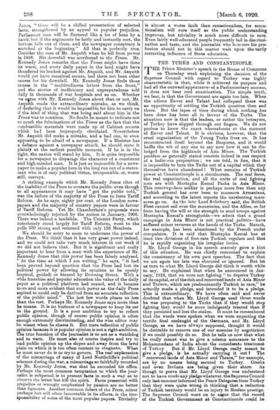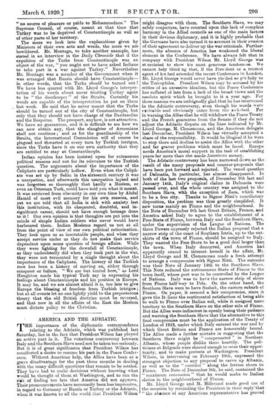THE TURKS AND CONSTANTINOPLE.
THE Prime Minister's speech in the House of Commons on Thursday week explaining the decision of the Supreme Council with regard to Turkey was highly characteristic in that, while it achieved its purpose and had all the outward appearances of a Parliamentary success, it does not bear cool examination. The simple truth, we fear, is that the Government are again too late. When the odious Enver and Talaat had collapsed there was an opportunity of settling the Turkish question then and there. But the lapse of time during which nothing has been done has been all in favour of the Turks. The situation now is that the leaders, or rather the betrayers, of Turkey have slipped through our fingers. We do not profess to know the exact whereabouts at the moment of Enver and Talaat. It is obvious, however, that the cruel organization of the Young Turks lives on. It has reconstructed itself beyond the Bosporus, and it would baffle the wit of any one to say now how it can be dis- lodged from the highlands of Asia Minor. The Turkish problem as generally stated consists indeed in one respect of a ludicrous proposition ; we are told, in fine, that it is impossible to turn the Turks out of a capital which they themselves have abandoned 1 What remains of Turkish power at Constantinople is a simulacrum. The real force, the real organization, and all the units of real fighting men are with Mustapha Kemal Pasha in Asia Minor. This unscrupulous soldier is perhaps more free than any Turkish general has ever been to massacre Armenians, and according to the latest reports the unrelenting mass- acres go on. As the late Lord Salisbury said, the British Fleet cannot sail over the mountains, and the Allies, so far from having the will or the strength to send troops against Mustapha Kemal's strongholds—we admit that a grand campaign in Asia Minor is not practical politics—have suffered minor reverses at the hands of the Turks. Marash, for example, has been abandoned by the French under compulsion. It is said that Mustapha Kemal has at least two divisions of first-rate Turkish regulars and that he is rapidly organizing his irregular levies.
Mr. Lloyd George in his speech scarcely gave a hint of this situation. He was chiefly concerned to explain the consistency of his own past speeches. The fact that we are again too late was obscured or ignored. But let us turn to what Mr. Lloyd George did think it worth while to say. He explained that when he announced in Jan- uary, 1918, that we were not fighting " to deprive Turkey of its capital, or of the rich and renowned lands of Asia Minor and Thrace, which are predominantly Turkish in race," he actually made a pledge, and intended it to be a pledge. This is extraordinary. We have often said and never doubted that when Mr. Lloyd George used those words he was proposing to the Turks that if they would stop fighting they would be more indulgently treated than if they persisted and lost the stakes. It must be remembered that the words were spoken when we were expecting the terrific final onslaught of the Germans, and Mr. Lloyd George, as we have always supposed, thought it would be desirable to remove one of our enemies by negotiation if we could possibly do so. But he tells us now that what he really meant was to give a solemn assurance to the Mohammedans of India about the considerate treatment of Turkey. But if Mr. Lloyd George, really meant to give a pledge, is he actually c it out T The " renowned lands of Asia Minor andrigagce," for example, are by no means being secured to Turkey. Greeks and even Italians are being given their share. As though to prove that Mr. Lloyd' George was understood not to have made any pledge whatever, the Supreme Council only last summer informed the Peace Delegates from Turkey that they were quite wrong in thinking that a reduction of Turkish territory would be an injury to Moslem prestige. The Supreme Council went on to ague that the record of the Turkish Government at Constantinople could be " no source of pleasure or pride to Mohammedans." The Supreme Council, of course, meant at that time that Turkey wee to be deprived of Constantinople as well as of other parts of her territory. The more we look into the explanations given by Ministers of their own acts and words, the more we are bewildered. Mr. Montagu, to take another example, has stated in an interview in the Daily Chronicle that if the ex-pulsion of the Turks from Constantinople was an object of the war, " you ought not to have asked Indians to take part in a war against Turkey." Nevertheless Mr. Montagu was a member of the Government when it was arranged that Russia should. have Constantinople— in other words, that the Turks should be turned out ! We have less quarrel with Mr. -Lloyd George's interpre- tation of his words about never trusting Turkey again to be " the doorkeeper " of the Straits. Certainly his words are capable of the interpretation he put on them last week. He said that he never meant that the Turks should be turned out of the city of Constantinople, but only that they should not have charge of the Dardanelles and the Bosporus. The prospect, anyhow, is not attractive. We have no guarantees, and it is difficult to see how we can now obtain any, that the slaughter of Armenians shall not continue ; and as for the guardianship of the Straits, the International Commission will of course be plagued and thwarted at every turn by Turkish intrigue, since the Turks have it on our own authority that they are entitled to stay at Constantinople.
Indian opinion has been insisted upon for extraneous political reasons and not for its relevance to the Turkish question. The arguments about' the importance of the Caliphate are particularly hollow. Even when the Caliph- ate was set up by Selim in the sixteenth century it was a usurpation, and afterwards this usurpation lapsed and was forgotten so thoroughly that hardly a Moslem, or even an Ottoman Turk, could have told you what it meant. It was retrieved from obscurity in our own time by Abdul Hamid of most evil memory for his own reasons, and yet we are told that all India is sick with anxiety lest this institution, with its chequered, doubtful, and in- significant career, should not have enough homage done to it I Our own opinion is that thoughts are put into the minds of simple Indian soldiers who never would have harboured them. Indian Moslems regard us not at all from the point of view of our own political ratiocination. They look upon us as inscrutable people, and when they accept service under us they do not make that service dependent u • • • some question of foreign affairs. While they were • hting for the downfall of Constantinople, as they undoubtedly did when they took part in the war, they were not tormented by a single thought about the importance of the Caliphate. The history of the Turkish race has been a history of moving on, either through conquest or failure. " We are but tented here," as Lord Houghton made his typical Turk say in expressing his feelings about Constantinople and his position in Europe. It may be, and we are almost afraid it is, too late to give Europe the blessing of freedom from Turkish intrigue ; but at all events let no one lightly yield to the preposterous theory that the old British doctrine must be reversed, and that now in all the affairs of the East the Moslem must dictate policy to the Christian.











































 Previous page
Previous page